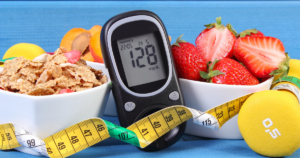Elusive Blood Sugar Management

Do you ever feel like regardless of what you do, your blood sugar is still all over the board?
Once you received the diagnosis of type 1 or type 2 diabetes, you should have been told to check your blood sugar several times each day to prevent complications that can develop from elevated blood sugar over a long time. Striving for normal blood sugar readings can feel extremely elusive and frustrating, but it doesn’t need to be. Checking your blood sugar level is like checking the speedometer on your car. It gives you information and tells you if you need to make adjustments. Blood sugar levels do not reflect personal character or intelligence.
There are many factors that affect your blood sugar. What you do or don’t eat has a huge impact on your blood sugar level, but it is not the only factor involved. Here are some other factors that can affect your blood sugar.
Stress:
We may not be attacked by predators nowadays, but we seem to be under constant lifestyle attack. Stress produced by a lion or your lifestyle will cause an increase in the hormones glucagon and cortisol, which increases blood sugar. Sleep deprivation also causes stress and increases cortisol levels. The good news is exercise, relaxation, meditation, and adequate sleep can reduce stress and lower blood sugar levels.
Exercise:
Insulin sensitivity is increased with exercise, which means your cells are better able to use the sugar in your bloodstream. Thus lowering your blood sugar level. Is your blood sugar high? Vacuum the floor, mow the lawn, clean out the garage, wash the windows, go for a walk or bike ride – these are all free, effective treatments to lower blood sugar.
Food:
Are you tired of hearing the long litany of foods you shouldn’t eat because you have diabetes? Are there foods you might want to eat more of to improve your health and lower your blood sugar?
Carbohydrates (“carbs”) are to be managed, not eliminated. Your body breaks down carbs into sugars (mostly glucose) and then insulin helps your body use the sugar for energy. When you eat too many carbs or have insulin-function problems, this process fails and blood glucose levels can rise. A dietitian can assist you in identifying the appropriate amount, distribution, and type of carbs to manage your blood glucose. You need complex carbs at least for a third of your carb intake. If you are taking insulin, your dietitian can also calculate the appropriate carb-to-insulin ratio so you can be pro-active and determine how much insulin to take based on how many carb grams you ate at your meal.
Fiber, specifically soluble fiber, has been shown to improve blood sugar management. Fiber slows carb digestion and sugar absorption. Fruits, vegetables, legumes, and whole grains are a great source of soluble fiber. Incorporating these foods in your diet would be very beneficial and effective for your blood sugar management. It is a balancing act to determine the appropriate amount because each of these foods also contributes to carbs.
Consult a dietitian who is also a Certified Diabetes Care and Education Specialist (CDCES) to find the answers tailored to your specific health needs and goals. CB
